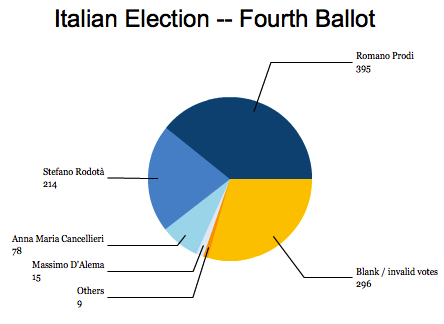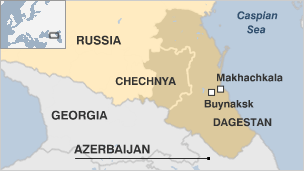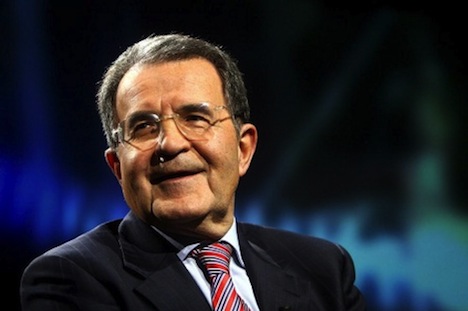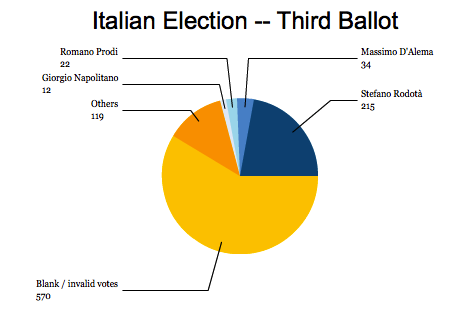It’s been a testy week in Venezuela, to say the least, but the decision of the CNE (the National Election Council) to conduct a full audit of all of the votes in last Sunday’s election is an olive branch that could pull the country from the brink of tipping into violence and further instability.![]()
When I left Caracas on Tuesday afternoon, opposition candidate Henrique Capriles was canceling a planned rally on Wednesday after acting president Nicolás Maduro threatened that Capriles would not be allowed to hold the rally, accused Capriles and the opposition of trying to mount a coup against him, warned that he would respond to the opposition with a firm hand, all the while arguing that Capriles was the person inciting violence.
Wednesday was hardly any less tense, with Leopoldo López claiming that arrest warrants had been issued against him and Capriles, the chief justice of Venezuela’s top court, Luisa Estella Morales, ruled out a manual recount of all of the votes, and National Assembly president Diosdado Cabello refused to allow any opposition deputies to speak until they recognized Maduro’s victory as legitimate.
But late yesterday, the CNE’s decision came even as Maduro himself flew to Lima for a short emergency meeting of UNASUR (Unión de Naciones Suramericanas, or the Union of South American Nations), which recognized Maduro’s victory, despite issuing a stern call for peace. It seems likely that the CNE decision may have been urged on by pressure from UNASUR, though that’s mere conjecture.
Maduro’s inauguration will proceed today as planned, though opposition officials will not attend.
Capriles has welcomed the CNE’s decision, though the CNE itself says the process of auditing results may take up to a month. For now, though, both sides are backing away from a very fraught five days:
Capriles explained that the announced audit of 46% of the remaining ballots represents 12,000 ballot boxes approximately. “Irregularities will be found in those 12,000 boxes,” he noted.
The opposition leader stressed that the audit shall include the verification of fingerprints, the recount of ballots, and the review of tally sheets and voters’ lists.
One of the key issues is determining how many votes Capriles received abroad — his campaign claims that he won 55,000 votes to just around 3,500 for Maduro. That’s not enough to make up the difference between the two (Maduro officially won 7.575 million votes to just 7.303 million for Capriles), but it could narrow the gap. It’s widely believed, however, that many of the votes abroad won’t make it back to Caracas — Hugo Chávez prior to the 2012 vote closed the Miami consulate, forcing south Florida Venezuelans to travel all the way to New Orleans to register their votes.
It seems fairly unlikely that a very pro-chavista CNE would countenance enough wrongdoing to hand the presidency to Capriles, so I don’t know what the endgame is here. Though Maduro may well have won on a purely numerical count, it’s impossible to know how many votes were bought, coerced or otherwise wrung out of an electoral machine that’s blurred the lines among the state, the state-owned oil company and the governing Partido Socialista Unido de Venezuela (PSUV, or United Socialist Party of Venezuela).
So the most likely scenario is that a long, drawn-out audit confirms Maduro as the winner. That doesn’t mean Capriles has ‘lost’ in the full sense of the word, necessarily — he’s brought chavismo to the brink of defeat, and Maduro’s weak mandate is for the continuity of chavismo, not for Maduro’s leadership in its own right. So it will likely be a very grim denouement for chavismo between now and 2019 — and the opposition will likely continue to grow in stature prior to 2015 parliamentary elections and a potential 2016 recall election to oust Maduro. In the meanwhile, schisms are likely to open within chavismo as Venezuela’s economy continues to worsen between those who want to double down on chavista-style socialism (or even more Cuban-style socialism) and those who want to reverse course.
It won’t be pretty, but for now, at least, it won’t be so ugly as to involve violence against opposition rallies. Given where Venezuela started its week, that’s not the worst outcome — even if you think Capriles is the rightful winner of Sunday’s vote.




